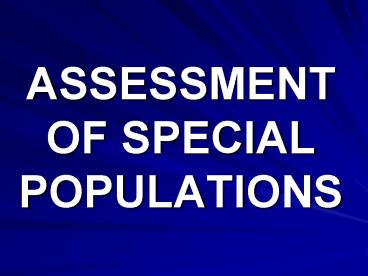ASSESSMENT OF SPECIAL POPULATIONS PowerPoint PPT Presentation
1 / 6
Title: ASSESSMENT OF SPECIAL POPULATIONS
1
ASSESSMENT OF SPECIAL POPULATIONS
2
YOUTH
- Assessment Considerations
- highest rates of substance abuse and highest
rates of problem gambling - Only minority will seek treatment themselves
- Need parental consent however, less likely to be
honest with parents present - Greater propensity for both exaggeration and
minimization (more lying, less insight) - Different psychometric screening instruments
- Given smaller body size and weaker tolerance,
adolescents can experience dangerous effects at a
lower level of consumption - Tend to show fewer signs of dependence and fewer
physical problems related to alcohol - Treatment Considerations
- High rates of natural recovery
- Family involvement in treatment very important
for success - If motivation not there then need leverage
3
Prevalence of heavy drug use as a function of age
4
ELDERLY
- Assessment Considerations
- Diagnostic criteria based on adverse social
consequences may not apply because elderly less
likely to be employed, married, or involved in
legal altercations - Symptoms may be harder to recognize because
- Daily demands may be easier to achieve than if
they were working or in a marital relationship - Poor memory, accidental falls and lack of energy
may be accepted as normal for elderly - Self-report may be less valid
- Greater denial
- Poorer memory
- Quantity frequency needed to produce impairment
is less - Even when family members recognize a problem,
they may deny its existence or inadvertently
collude with the client out of their own feelings
of shame - High rates of rx substance abuse
- Substance abuse interferes with normal medication
regime (either forget or drug interactions) - Treatment Considerations
- Highest rates of suicide
- Individuals who have been abusing alcohol for
extended period of time may become estranged from
their families and distanced from potential
assistance
5
CROSS-CULTURAL ASSESSMENT
- need to appreciate cross-cultural differences in
substance use - Alcohol
- in many Muslim countries any alcohol drinking is
regarded as culturally aberrant - it is normal for children in many European
countries to have alcohol with meals - North Americans have a higher tolerance for
drunken behaviour than most other places - Opium
- opium a normal part of many middle eastern and
Asian cultures - In contrast, all non-rx use in western countries
is illegal - Cannabis
- More normative use in India and Jamaica compared
to other countries - Tobacco
- Religious significance in N.A. Aboriginal
populations - Peyote
- mescaline (peyote) a part of religious ceremonies
of Native American Church of North America - Others
- cocaine and Andean Indians
- kava kava and south pacific
- Gambling
6
- Cross-cultural differences in what is considered
pathological - suicide in Japan and India (widows)
hallucinations and witch doctors "wolf-boy of
Thompson" pedophilia in South Pacific and New
Guinea female assertiveness - cross-cultural differences in manifestation of
psychopathology - psychosomatic problems more common forms of
distress in some cultures - In Aboriginals it is not uncommon for depression
to take the form of a loss or disturbed sense of
spirituality/connection with ancestors/connection
with the creator. - need to understand cross-cultural differences in
how problems are communicated - much more humiliating to admit a problem in Asian
cultures - admitting problems historically not encouraged in
Aboriginal culture - need to ensure culturally congruent interventions

